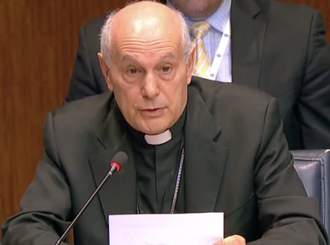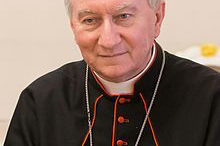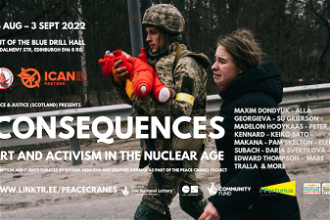Vatican envoy addresses UN on nuclear weapons

Archbishop Gabriele Caccia
Source: Vatican Media
Archbishop Gabriele Caccia, Permanent Observer of the Holy See to the United Nations, delivered a statement to the First Committee of the General Assembly, which addresses issues related to disarmament and international security. The statement was delivered as part of the committee's general debate on 12 October.
In his remarks, Archbishop Caccia recalled that the Cuban missile crisis was averted only through banning nuclear weapons, disarmament, dialogue, and the building of mutual trust. Considering that "disarmament architecture now hangs by a thread," he called for the adoption of an approach of integral disarmament and unequivocal condemnation of any threat to use nuclear weapons.
While highlighting the Comprehensive Nuclear-Test-Ban Treaty (CTBT) and Treaty on the Prohibition of Nuclear Weapons (TPNW), which complement the Nuclear Non-Proliferation Treaty (NPT), as signs of hope, Archbishop Caccia also noted his concern over the failure of the Tenth NPT Review Conference to achieve consensus, the surpassing of $2 trillion on military and weapons expenditure, the weaponization of outer space, and the growing malicious use of ICTs and lethal autonomous weapons systems (LAWS).
The text of the statement follows.
Statement by HE Archbishop Gabriele Caccia
Apostolic Nuncio and Permanent Observer of the Holy See
at the General Debate of the First Committee of the 77th Session
of the United Nations General Assembly
Mr Chair,
My delegation congratulates you on your election and would like to assure you of its full support during this session.
Sixty years ago, humanity stood on the precipice of nuclear annihilation as the United States and the Soviet Union came perilously close to war in the Caribbean Sea. It was only through their leaders' commitment to dialogue and recognition of the devastating impact of nuclear war that the world averted destruction.
Writing shortly after the crisis, Pope John XXIII observed "that true and lasting peace among nations cannot consist in the possession of an equal supply of armaments but only in mutual trust."[1] On the basis of such trust, he called for the banning of nuclear weapons and for disarmament under "an effective system of mutual control."[2]
Over the ensuing decades, States began to construct the disarmament architecture as we know it. However, the goal of general and complete disarmament remains out of reach due to, in the words of Pope Francis, "a lack of vision for the future and shared consciousness of our common destiny."[3]
The disarmament architecture now hangs by a thread. Leaders must recommit to dialogue and adopt an approach of integral disarmament, "which calls on every person to disarm his or her own heart and to be a peacemaker everywhere."[4] As Pope Francis has said, "International peace and stability cannot be based on a false sense of security, on the threat of mutual destruction or total annihilation, or on simply maintaining a balance of power."[5] In light of this, the Holy See reiterates that any threat to use nuclear weapons merits unequivocal and unhesitating condemnation.[6]
Mr. Chair,
Even in our troubled times, there are signs of hope for disarmament.
This year, another six States ratified the Comprehensive Nuclear-Test-Ban Treaty (CTBT), moving it toward universalization. The Holy See calls upon all States, especially the remaining Annex II States, to promptly sign and ratify the Treaty. The over two thousand nuclear tests that have occurred since the dawn of the nuclear age have brought untold suffering to thousands of people and have rendered some natural environments unliveable. Given this appalling record, it is beyond time to verifiably ban nuclear testing for all States.
In another positive development, nine States ratified, and five States signed the Treaty on the Prohibition of Nuclear Weapons (TPNW) this year, signaling their recognition that nuclear deterrence is not only illegal but also immoral. States Parties have adopted an integral approach toward redressing nuclear harm, transforming "a culture of injustice and violence to a culture of fraternal love" that assists victims and remediates contaminated environments in a restorative manner. In doing so, the Treaty complements both the CTBT and the Nuclear Non-Proliferation Treaty (NPT).
The success of the First Meeting of States Parties of the TPNW contrasts with the regrettable failure of the Tenth NPT Review Conference to achieve consensus. This failure demonstrated that many States still subscribe to what Pope Francis describes as a "perverse dichotomy that tries to defend and ensure stability and peace through a false sense of security sustained by a mentality of fear and mistrust".[7] Until we transition from such a mindset towards one of integral disarmament, the threat of nuclear weapons use will remain. Their total elimination is the only guarantee that they will not be used again.
Mr Chair,
As Pope Saint Paul VI observed during his address before the General Assembly in 1965, "A person cannot love with offensive weapons in his hands."[8] This year, world military expenditure passed $2 trillion for the first time.[9] This harmful spending squanders resources that could promote integral human development and save countless lives. Without addressing this rampant proliferation, achieving the Sustainable Development Goals (SDGs) will remain elusive. Most worrisome is the growing use of indiscriminate weaponry, such as antipersonnel mines and cluster munitions. The Holy See condemns this use and calls on all States to swiftly ratify or accede to the conventions prohibiting such weapons.
Mr. Chair,
The threats posed by the proliferation of weapons extend beyond terrestrial areas. The Holy See notes with concern the development of orbital weapon systems and anti-satellite missiles. As outer space forms part of our common home, it is our responsibility to ensure that all, including future generations, can benefit from its vast potential. The testing of anti-satellite missiles at any altitude is incompatible with this responsibility. The Holy See welcomes moratoria on such tests as a first step toward banning them outright. Such a ban could complement laudable legal efforts to prohibit the weaponization of outer space.
Pope Francis has observed that the internet "offers immense possibilities for encounter and solidarity."[10]These possibilities, however, are threatened by the malicious use of information and communications technologies (ICTs). To defend against this threat, it is essential that all States foster a spirit of fraternity in implementing the eleven UN norms of responsible State behavior in cyberspace, as outlined in the 2021 report of the Group of Governmental Experts. In particular, the protection of critical infrastructure and the reporting of vulnerabilities are crucial for limiting the real-world consequences of cyberattacks, which have the potential to cause real harm to persons.
Other new technologies also put humanity at risk. In his address to the Seventy-Fifth Session of the UN General Assembly, Pope Francis warned that "lethal autonomous weapons systems (LAWS) […] irreversibly alter the nature of warfare, detaching it further from human agency."[11] By separating the unique human capacity for moral judgment from actions that could result in bodily harm or even death, LAWS cannot maintain compliance with International Humanitarian Law (IHL). In light of this, the Holy See urges for the consideration of a moratorium on the development and use of LAWS pending the negotiation of a legal instrument that prohibits such systems from targeting humans and ensures that all weapons systems remain under meaningful, human control.
Mr Chair,
In closing, the Holy See must express concern regarding the introduction of ambiguous, non-consensual terminology within fora pertaining to disarmament. It is the hope of my delegation that this issue does not arise here, which would create unneeded barriers in the way of our common efforts to advance disarmament and build a culture of peace.
Thank you, Mr Chair.
[1] Pope John XXIII, Encyclical Letter Pacem in Terris, 11 April 1963, 113.
[2] Pope John XXIII, Encyclical Letter Pacem in Terris, 11 April 1963, 112.
[3] Pope Francis, Encyclical Letter Fratelli Tutti, 3 October 2020, 260.
[4] [For reference only] Cardinal Silvano Tomasi, "Pope Francis' Vision of Peace: Disarmament, Development and Inclusiveness in the Catholic Conception of a Just Peace", Georgetown University, Washington, DC, 30 January 2020.
[5] Pope Francis, Encyclical Letter Fratelli Tutti, 3 October 2020, 262.
[6] Cf Pastoral Constitution on the Church in the Modern World Gaudium et Spes, 7 December 1965.
[7] Pope Francis, Address on Nuclear Weapons at the Atomic Bomb Hypocenter Park (Nagasaki), 24 November 2019.
[8] Pope Paul VI, Address to the United Nations Organization, 4 October 1965.
[9] [For reference only] Stockholm International Peace Research Institute (SIPRI), "World military expenditure passes $2 trillion for the first time," 25 April 2022.
[10] Pope Francis, Encyclical Letter, Fratelli Tutti, 205.
[11] Pope Francis, Address to the Seventy-Fifth Session of the United Nations General Assembly, 25 September 2020.


















